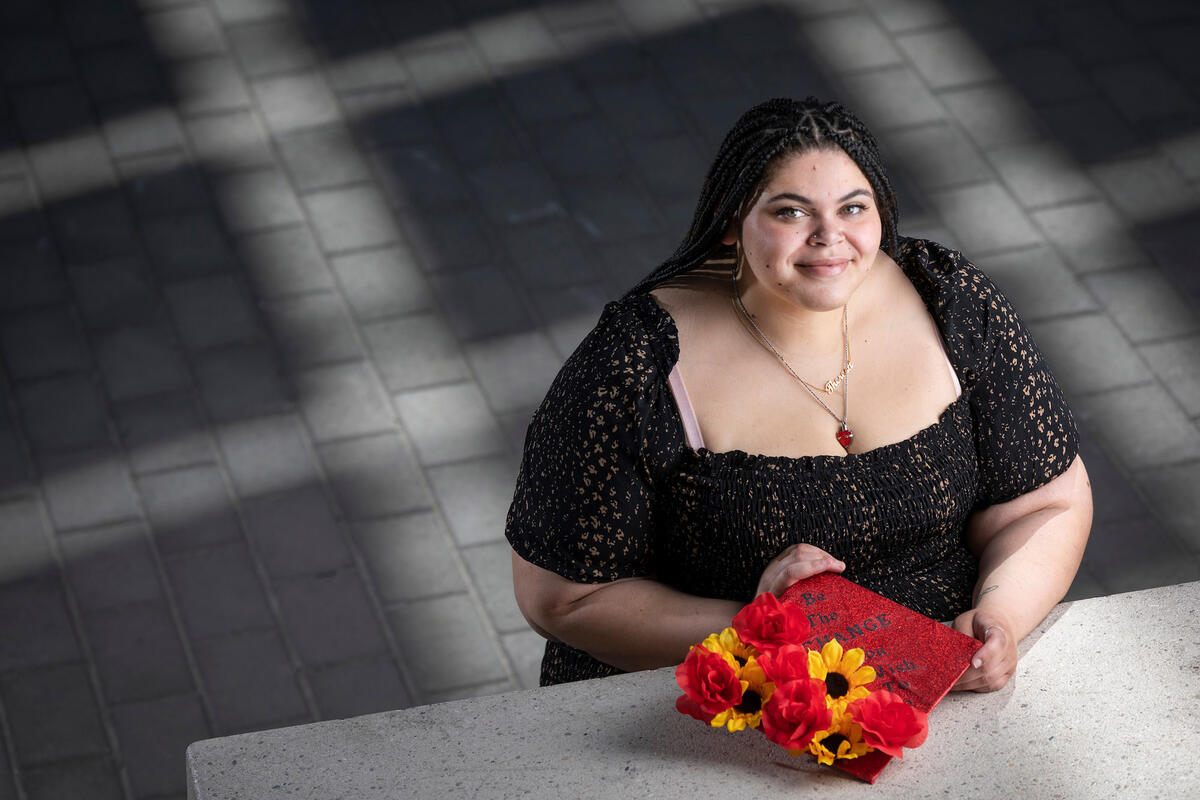When Theresa Butler receives her diploma this spring, it will be a victory over staggering odds.
Butler, who was homeless for much of high school, was in the first cohort of UNLV HOPE Scholars, a program to help youth who experienced homelessness transition to college — and succeed.
“I am so excited,” she said. “There were times it was really tough. But I’m so proud of myself, and I want others to know they can do it, too.”
Butler will be receiving her bachelor's in urban studies, going directly into the UNLV Masters in Public Administration program, and devoting herself to making a difference in public policy related to homeless youth.
“I now feel invincible as an advocate,” she said. “My experience as a HOPE Scholar has everything to do with that. That’s why I am where I am – graduating and going to grad school.”
A partnership between UNLV, Clark County School District, and the Nevada Partnership for Homeless Youth, the HOPE Scholars program identifies about six homeless high school students each year who want to go to college and helps them adjust.
Over the years, private donors have given more than $130,000 to the HOPE Scholars program, in more than 550 individual gifts. And University Park LLC has contributed living space in The Degree student housing community to help give HOPE Scholars a place to call home. Donor support contributes to on-campus housing, food, and tuition.
Overcoming trauma
Throughout their HOPE academic journey, they attend workshops on topics such as financial literacy and nutrition; use resources like the Academic Success Center and the Health and Wellness Center; and meet with Anabel Chavva, coordinator of HOPE, at least once a month.
“They have experienced a lot of trauma,” Chavva said. “Of course they have all experienced homelessness in different ways. Some students have been going from couches to floors to shelters, and some feel a sense of relief to have student housing. But some are still on the edge of their seat – ‘will it go away?’ – because they are not used to trust yet.”
About Butler, Chavva said, “I have seen an incredible growth in her. I remember my first meeting with her. She seemed skeptical; she had experienced a lot of jumping around. But when she really explained things to me, and she explained her family situations, and the triggers for her, we worked together.
“So we built trust. Trust is key for success for our students.”
There are multiple reasons youth may end up homeless: parents who have addiction issues, loss of family income, parents who kick out LGBTQ kids, or lack of affordable housing, among others.
But Butler isn’t interested in talking about what drove her to experience homelessness as a youth anymore. She uses her experiences to fight passionately for other youth in similar situations.
“I’ve learned that I’m a big-picture person,” Butler said. “I became interested in making a difference at the policy level during the 2019 legislative session.”
For example, she supported Assembly Bill 363, which waived the fee for homeless youth to get their ID from the Department of Motor Vehicles.
“You can’t get a job or a place to live without this kind of documentation," she said. "I found my calling in the desire to impact communities.”
Advocating from experience
Butler has already built a network of influencers in the political system, and is interning for the Nevada Department of Education with the Mckinney-Vento office. She has also become a well-respected presence at the annual Southern Nevada Youth Homeless Summit, and among staff and constituents at the Nevada Partnership for Homeless Youth.
“Getting to see someone like Theresa who has been through it, and saying, ‘I can see that it’s possible’ — that’s powerful,” said Melissa Jacobowitz, director of development and evaluation for the partnership.
“When it comes to fighting for homeless youth, people who have experienced it are the best experts,” Jacobowitz said. “I’m really excited to see what Theresa will do for the community. She is very dedicated and we love working with her.”
Theresa said it took time to learn about herself, her passions, and her strengths and weaknesses. As she looks forward to graduating, she exudes a confidence that has been built through the HOPE program over the years.
“My support system is strong now, and I don’t have to break my neck to secure it anymore. I give credit to the HOPE Scholars program for that, too. The HOPE Scholars program is my support system and it’s solid. The majority of my friends are from the program,” she says.
“I really want to be successful. I have this baggage, and it became more apparent over the years that I was traumatized by (being homeless as a youth), but I have learned to take ownership of my trauma, and I went through my homelessness — and now my goal is to eradicate it.”



